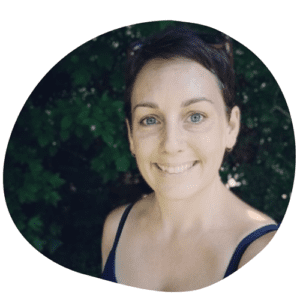
With my #NoSocialMedia #UnmarketingExperiment and departure from Facebook looming, I invited my friend and colleague, Sarah Taylor, for a chat about how she’s navigating the challenges of marketing with social media with integrity.
Sarah is an intentional business coach who helps entrepreneurs unhook from mainstream marketing to create their businesses with intention and impact. I’ve watched her test and experiment with social media and marketing over the years, and knew she’d have valuable insights to impart.
In this playful, passionate conversation, we explore:
- What Sarah learned from after taking a six month break from social media
- Sarah’s hero who ran a successful business from a newsletter with no social media
- Unhooking from mainstream marketing and addictive platforms while maintaining your connection to friends, clients and community
- What consent-based marketing looks like with an email list
- How to tap existing ecosystems and permaculture design principles for a sustainable, ethical business
- Advice if you’re considering leaving social media
Watch the video of our full chat or grab some highlights in the article below.
Unhook From Mainstream Marketing
So much of the pressure to follow mainstream marketing, as Sarah sees it, stems from fear and lack, the “shoulds” of how business must be done, or else.
Social media platforms are created to make money, and they are intentionally made addictive to keep users on the platform longer for the purposes of collecting data and selling ads. They’re tools we can use (or not) and accepting their nature can help manage the use of a platform that’s built for addiction. You can choose to market your business with strategies that are aligned and authentic for you.
“I believe that business is activism. I believe it’s a powerful tool for cultural change and I believe it’s most impactful when we intentionally design it to care for Earth, care for people and create high impact social justice.”
Sarah Taylor, Intentional Business Coach
An intentional business begins with the question, “What would you like to do?” It’s a jumping off point Sarah uses to illustrate your agency and autonomy to do business your way.
Most entrepreneurs have not stopped to ask this of themselves; instead, they turn to business coaches and marketing experts selling systems and strategies that completely bypass this inquiry.
Sarah insists that you can create a sustainable business without social media, manipulative marketing, or anything else you find distasteful.
She points to the example of Paul Jarvis, tech designer, author and internet consultant, who ran a successful business from a weekly newsletter, entirely without social media. He flouts conventional business strategies and pioneers new technologies to align with his values.
(Jarvis’ personal brand and website is no longer available, and his links now point to the company Fathom Analytics, which offers website analytics that respect digital privacy.)
“If you aren’t paying for the product, you are the product.”
quoted on the Fathom website
Is Facebook Fading Out?

After experimenting with her use of social media over the years and taking breaks from all platforms for periods of three and six months, Sarah is gradually shifting her focus to the ecosystems where her ideal clients are already engaged, and building relationships there instead.
In 2018, the daily usage of Facebook in the U.S. and Canada dropped by 8% for the first time ever. While the behemoth is still adding more users, this is indicative of an overall decline in usage by its original population.
Sarah has been watching digital marketers diversify their following by encouraging people to sign up for their email lists or to receive SMS messages, moving them to places where they control communication on their own platforms. It makes good sense to be aware of these changes in social media and to create avenues for connecting with potential clients beyond social media.
In response to noxious Facebook ads aimed at Sarah’s demographic, she changed her gender and unfollowed most pages. The disappearance of sexist and age-targeted advertising was immediate. As Dave Booda shared in this article, there are numerous creative ways to curate or limit the content appearing in your Facebook feed.
Consent-Based Marketing
Sarah explains that mainstream marketing abuses the psychological principle of reciprocity, a social trigger that encourages us to pay back what we receive from others.
Marketers strategically give away free lead magnets or events, invoking this trigger in an attempt to influence people to buy. Once a prospect had given them permission to send emails, the marketer will then flood their inboxes without restraint.
In contrast, consent-based marketing, which Sarah encountered through the work of Kelly Diels, asks permission to market along the way, rather than assuming that simply because someone signed up for an email list years ago, the marketer has the right to send unlimited emails.
This is marketing as a conversation with human beings who actually want to engage in it, and making it easy for them to opt-out is part of the package. An example might be clearly explaining how often subscribers willl receive emails, and checking in before launches or events where more than the usual number of emails will be sent, providing an easy way to opt-out of them.
Advice For Navigating Social Media
Sarah shares some tips for sanely navigating the use of social media based on her own experience.
Go slowly and experiment. Follow your intuition if something doesn’t feel right, and give yourself permission to try new things. There’s no need to rush, so take your time.
Observe before you engage. Spend some time simply watching when you join a new community or group to evaluate if this is an ecosystem and conversation you’d like to engage in. Use your time and energy wisely.
Network for ecosystems, not clients. Rather than trolling for clients, identify communities where your ideal clients are already engaged. Build relationships and trusted partnerships there and you’ll be invited to these spaces where you’ll naturally connect with clients.
Sarah asks clients this question to draw out their aligned community, “If you had to be stuck in a room for two weeks with five people, who would you want them to be?”
Your answer reveals “your tribe,” the people who are having conversations where you can contribute. Once you understand your natural inclinations for community, identifying and connecting with them is an easy choice.
Diversify your client sources and have a back up plan. If social media is the primary place where you connect with clients, explore alternative avenues through ecosystems and invite people onto your own platform (email list, podcast following, website community) where you can cultivate the relationship.
Identify where your clients come from and how you can replicate those connections without social media. Do more of what’s working or incentivize and reward the relationships and sources who are sending referrals.
Meet Sarah Taylor, Intentional Business Coach

Sarah Taylor’s work is at the intersection of permaculture, feminism and business. She helps conscious entrepreneurs unhook from mainstream marketing, so they can sell without compromising their integrity.
Over the last 4 years Sarah has developed gentle marketing strategies, ethical business practices and a regenerative framework that helps you create a business that cares for Earth and cares for people.
She’s written copy for corporations and small businesses and has worked with entrepreneurs on connecting to their purpose and building out their message, platform and income through the lens of intention.
Sarah also writes emails delivered every two weeks that question the social norms of mainstream marketing, explore alternatives to capitalism and share ways to build regenerative economies.
Connect with Sarah
Website: https://sarahtaylor.net
Instagram: https://www.instagram.com/sarahtaylor_net